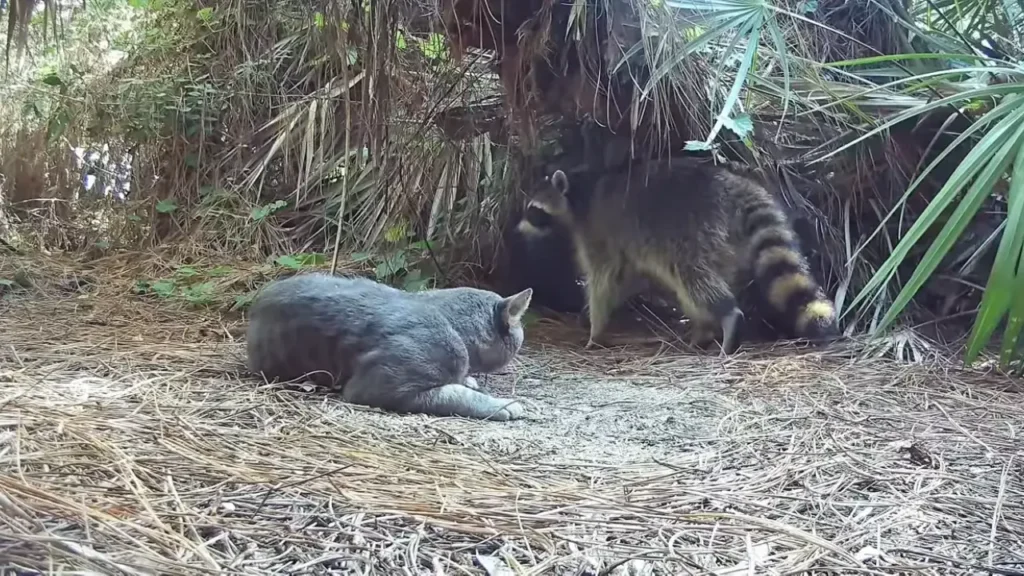Are raccoons a threat to cats? The relationship between raccoons and cats has been a topic of concern for pet owners and wildlife enthusiasts alike.
In this article, we delve into the interactions between these two species to shed light on whether raccoons pose a real danger to our feline companions.
Do Raccoons Kill Cats?

Many raccoons may exhibit aggressive behavior towards cats, although larger cats tend to avoid confrontations with raccoons due to their keen instincts.
Raccoons are known for their agility and quick hunting prowess. In certain cases, raccoons have been observed using their sharp claws to inflict harm on cats, followed by swift and ferocious bites.
How to Protect Cats from Raccoons
Here are some ways to protect cats from raccoons:
- Use a raccoon-proof cat door: Consider installing a microchip cat door, which only allows entry to cats with the corresponding microchip, effectively keeping raccoons out.
- Vaccinate cats against rabies: Since raccoons can transmit rabies, it’s crucial to vaccinate your cats to protect them from this disease.
- Keep cat feeding areas clean: Raccoons are attracted to cat food, so it’s essential to remove food bowls and any leftover food after your cats have finished eating. You may also want to place food bowls on a high platform that only cats can access.
- Place cat shelters at an elevated location: If you have outdoor cat shelters, consider placing them at a height that raccoons cannot easily reach, preventing them from entering and causing problems.
- Keep cat food in a high location: Storing your cat’s food in an elevated place, such as a countertop, can be an effective way to deter raccoons from accessing it.
- Keep cats indoors: The safest way to protect cats from predators like raccoons is to keep them indoors. If you’d like to provide outdoor experiences for your cat, consider constructing a catio, an enclosed outdoor space that allows cats to enjoy the outdoors while remaining safe from potential threats.
For more information, please refer to our full guide on ‘how to get rid of raccoons.’
What to Do if a Raccoon Attacks a Cat
If a raccoon attacks a cat, here are some steps to help you in that situation:
- Seek immediate veterinary care: Take your cat to a veterinarian promptly if it sustains a bite or scratch from a raccoon.
- Clean the wound: If the wound is not severe, clean it with soap and water, and apply an antiseptic.
- Monitor the cat: Keep a close eye on your cat for any signs of infection or illness.
- Educate yourself and your neighbors: Learn about the dangers of raccoons and how to keep your pets safe. Educate your neighbors about the importance of vaccinating their pets against rabies.
- Keep cats indoors: The best way to protect cats from raccoons is to keep them indoors, especially at night when raccoons are most active.
- Call a wildlife control professional: If you have a raccoon problem in your area, consider contacting a wildlife control professional to help remove the raccoons and prevent future attacks.
- Report the incident: If your cat is attacked by a raccoon, report the incident to your local animal control agency. This can help prevent future attacks and protect other pets in the area.”
Common Injuries That Cats Sustain in a Raccoon Attack
When cats suffer injuries as a result of raccoon attacks, these injuries can manifest through direct physical harm, like biting or scratching, or indirectly through the transmission of diseases.
Among the various injuries that cats may experience, including those associated with raccoon encounters, tail injuries are a notable concern.
Tail pull injuries can lead to nerve damage, tail fractures, and may not exhibit external signs of damage. Additionally, cats may ingest foreign bodies or objects, posing risks such as obstructions, choking, poisoning, or other life-threatening complications.
Raccoon disease is another potential threat to cats, often stemming from direct contact with nematode-contaminated feces or the ingestion of Baylisacaris procyonis eggs and larvae. Fight wounds, resulting from interactions with other cats or animals, are also common.
These wounds, often found on the head, forelimbs, or at the base of the tail, frequently lead to infections that can become severe if left untreated. Limping may occur if a leg is bitten. Furthermore, open wounds can emerge on various parts of the body, such as the legs, sometimes necessitating soaking in warm Epsom salts to draw out infection and prevent its spread.
Keeping cats securely contained at home can significantly reduce many of these risks. If your cat sustains an injury, seeking prompt veterinary treatment is essential to ensure proper care and facilitate a speedy recovery.
Can a Cat Win against a Raccoon
It’s highly unlikely for a cat to emerge victorious in a fight against a raccoon. Raccoons are generally larger and stronger than most cats, making it challenging for a cat to mount an effective attack.
In fact, there are recorded instances of raccoon attacks on cats, as documented in videos on YouTube. While there might be rare cases where a cat can successfully defend itself against a raccoon, such scenarios are not the norm.
To minimize the risk of encounters with raccoons and other wildlife, it’s crucial to keep cats securely contained at home.

